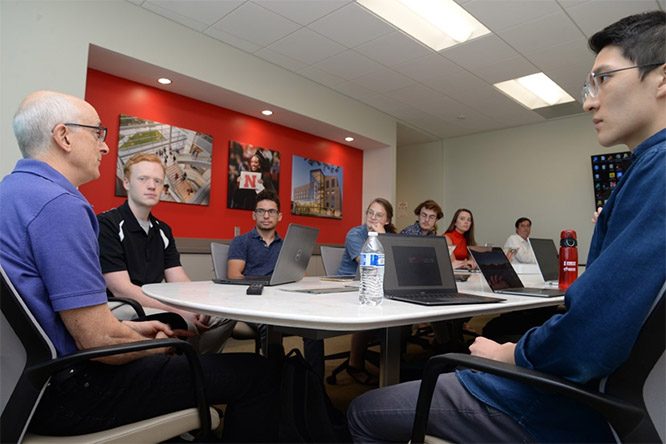Aaron Wang arrived at the University of Nebraska–Lincoln wanting to extend his proud ethnic heritage but unsure of the relationships he could build as a Husker. The cultural connections at the College of Business and the diversity of ideas in the Actuarial Science Program helped lead him to the Massachusetts Institute of Technology (MIT) for a master’s degree this fall.
“My parents emigrated from China 30 years ago, so I was born in the United States but I have Chinese heritage as well,” said Wang, who graduated with highest distinction following the May 2020 semester. “I grew up in small towns so I didn’t have a lot of diverse connections but was searching for it. When I came to Nebraska, I saw diversity in the campus, the clubs and the classes, and I really cherish that part of my experience.”
Due to his strong desire to learn from others, the diversity a Big Ten campus offered paid immediate dividends.
“A lot of people only think about diversity as being from a different culture, but the way it plays out in the classroom is you can have one person from a rural area, someone else from Ethiopia and another from Japan. That’s where diverse thinking and viewpoints helps a lot. I may be working on a class project and thinking about it one way but not seeing the other person’s perspective. That’s what stands out to me about the College of Business and made it special,” he said.
 Aaron Wang (far right) listens to Dr. David Rosenbaum, professor of economics and associate professor of the Bureau of Business Research, explain research objectives to fellow Bureau of Business Research Scholars.
Aaron Wang (far right) listens to Dr. David Rosenbaum, professor of economics and associate professor of the Bureau of Business Research, explain research objectives to fellow Bureau of Business Research Scholars.
Last fall Wang gained a new perspective while working on a team project in his Actuarial Applications in Practice (ACTS 475) capstone class. The project involved developing business strategies for Lincoln Financial Group in Omaha, Nebraska, and opened his eyes to where his career might take him.
“I was fortunate to be on a very diverse team. We had a graduate student who studied computer science, another who had experience working on a family farm and others who had impressive presentation skills. Our computer science team member had access to the university’s super computer which let us run complex algorithms. I didn’t know anything about machine learning before that experience but it was a turning point for me,” said Wang.
Sue Vagts, director of the Actuarial Science Program and Ameritas Faculty Fellow, saw Wang seize opportunities throughout his time in the program.
“Aaron’s group had some unique approaches to the problems they were trying to solve,” said Vagts. “They accessed all the tools they had available to them, and Aaron really helped his group both as a leader and learning new skills. His group attracted the attention of Lincoln Financial Group with the gutsy way they approached the project. They took a risk to see how far they could go.”
The project gave Wang a better idea about how people from different backgrounds can come together to get results.
“Working in that team showed me how artificial intelligence and machine learning can improve business decision-making. When I was looking at graduate schools, I wasn’t sure if I wanted to focus on finance or actuarial science but when I realized machine learning was so exciting to me I decided that’s the field I wanted to pursue, and luckily ended up at MIT,” Wang said.
In addition to his work in actuarial science, Wang diversified his education by working in undergraduate research as a Bureau of Business Research Scholar in the Department of Economics. A research fair he hoped to participate in his final semester took a detour with the COVID-19 pandemic, as well as the closing of classrooms and public events. Fortunately, a response by the university provided Wang the chance to share his research in a different way.
“Originally we planned to have a poster fair to highlight our research, and I was very excited about presenting my findings,” he said. “After the entire endeavor got canceled, we worked out presenting our research on a Zoom meeting. It wasn’t the best case scenario, but I still got to talk about my findings and reach the same audience I would at the research fair.”
Wang’s research analyzed data to show how innovation spreads on social media. Once again, it gave him the opportunity to work with diverse-minded colleagues to grow his analytical skills.
“His breadth of involvement at Nebraska has been impressive,” said Vagts. “Beyond his work in actuarial science, he has a strong interest in data science and analytics. He went out and found interesting internships mostly on his own. He had a traditional internship and then an analytics internship. MIT recognized his unique analytics skills.”
Wang credits Vagts and the other actuarial science faculty for staying connected and giving him opportunities to discover his innate talents – even during the unusual circumstances of a pandemic.
“Even while I finished my last semester at home, I still felt linked to the program,” he said. “The faculty response through emails and weekly Zoom meeting kept me feeling looped in to the program. I talked to friends at other schools who experienced a lack of communication once everything went online, but I felt connected to my teachers and classes even after we transitioned to a remote environment.”
To learn more about the Actuarial Science Program, visit: https://business.unl.edu/academic-programs/departments/finance/actuarial-science/.
To learn more about the Bureau of Business Research Scholars, visit: https://business.unl.edu/outreach/bureau-of-business-research/academic-research/bbr-scholars/.
Published: May 13, 2020